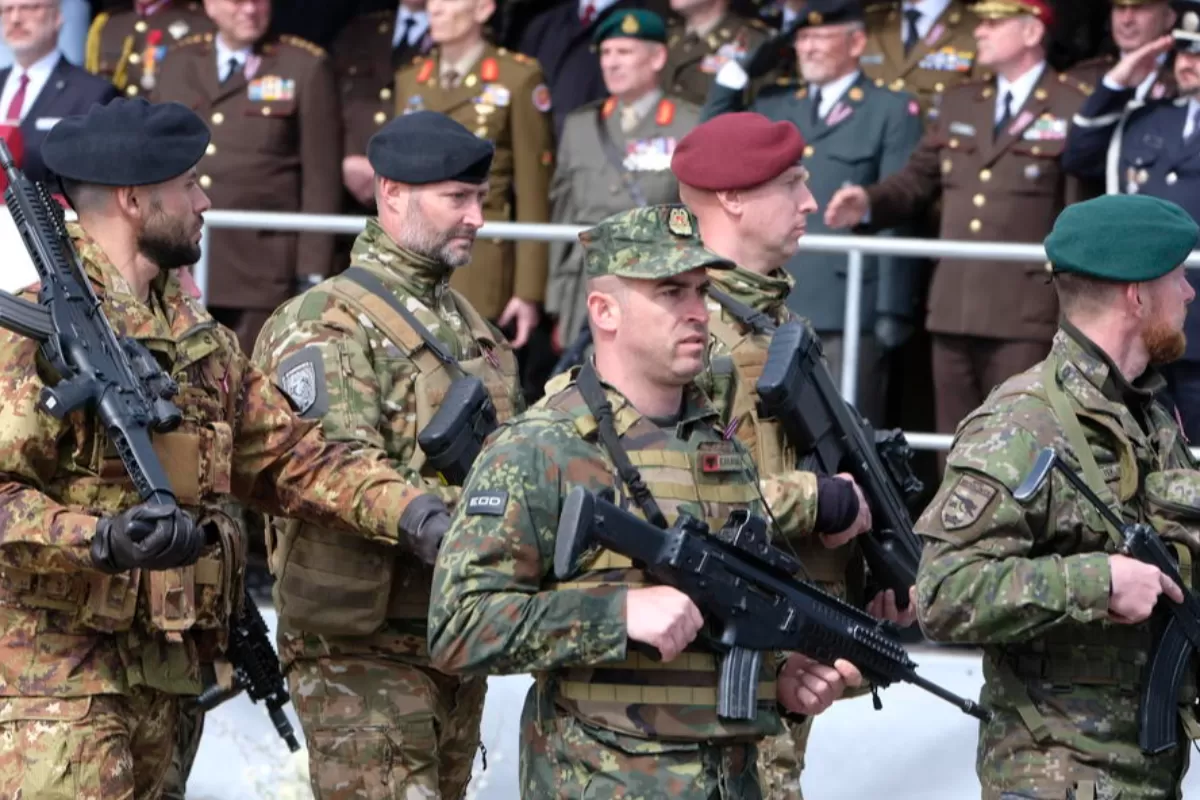
The issue of the security of the Baltic States has always been more or less topical since the collapse of the Soviet Union. It becomes aggravated from time to time. One of the most serious exacerbations was in 2014 when the annexation of Crimea happened and the war in the Donbas started. Later that year, NATO set up independent bases in the Baltic States and Poland. A new upheaval came with the Russian president's Vladimir Putin ultimatum at the end of 2021 for NATO to withdraw behind its 1997 borders, and on February 24 with Russia's invasion of Ukraine.
From life with the Soviet/Russian army to NATO
When the Baltic states regained their independence in the early 1990s and the Soviet government recognized these countries as substantive countries in September 1991, one of the next questions was how to get rid of the Soviet or Russian army because they had bases throughout the Baltics. In Soviet times, the Baltics were a highly militarized region and large areas of the west coast of the Baltic States were inaccessible to the population. The Soviets feared that people would flee the Soviet Union by sea as they did during WWII. Moreover, the Baltics were the border of the entire Soviet Union, and they were geographically close to the West.
The Russian troops left Lithuania by August the 31st 1993, Latvia and Estonia – exactly one year later. However, only on the 31st of August 1998 did Russia stop using the military radar station near the Latvian town of Skrunda.
A few years later – in 2002 – all three Baltic states applied to join NATO and got in on 29 March 2004. This and the EU accession soon after that, on May 1st, 2004, put the Baltics in the Western world.
The effect of the war in Ukraine
The security situation in Eastern Europe began to deteriorate sharply in the second half of 2021. The migrant crisis caused by Belarus, which the Baltic States, Poland, and the European Union classified as a hybrid attack, was followed by the mobilization of Russian forces around Ukraine. Moreover, in December 2021 Russia demanded legal guarantees from NATO and demanded the Alliance to withdraw its forces behind the 1997 lines. NATO rejected these demands.
Around two months later Russia started the war in Ukraine that is still ongoing. The Russian invasion of Ukraine had a strong impact on Baltic societies. For instance, many ethnic Russians in Estonia reconsidered their attitude toward Russia and Vladimir Putin personally on the 24th of February. According to Jevgenia Volohhonskaja, the Russian-language TV news Editor at ERR News, still 25% of Russian-speaking people even on the 24th of February supported Russia and Putin, but 50% were in shock. After the invasion, only 27% of ethnic Russians saw Russian media as trustworthy opposite to 40%. However, Russians are not considered a threat to Estonia, emphasizes Heiko Pääbo, lecturer at the University of Tartu, in Estonia, and program director for Central and Eastern European, Russian and Eurasian Studies. He told Veridica that from the very beginning, it was clearly said that this was Putin’s war.
In Lithuania, many people decided to prepare themselves for the worst scenario and, for example, joined Lithuanian Riflemen’s Union. Lithuanians are acknowledging that there is no other choice but to prepare for a potential aggression.
In Latvia, according to surveys done at the end of April, most people said they supported Ukraine (66.9%) while the number of Russian supporters was significantly less (5.6%).
However, there is quite a big difference between those who speak at home Latvian and those who speak Russian. Among the Latvian speakers, there was clear support for Ukraine (89%) while among the Russian speakers almost half (47%) of the respondents said they do not support any of the sides. However, at the same time, there was a protest, probably the first of its kind, of Latvian Russians condemning Russia’s and Putin’s policies.
Of course, most of the population of the Baltic States warmly welcomed Ukrainian refugees and the Baltic States are the most generous countries in the bilateral aid to Ukraine per GDP: by May the 2nd Estonia had given 0.78% of its GDP, Latvia 0.73%, and Lithuania, 0.17%. In other words, Estonia ranked the first, Latvia - the second, and Lithuania - the sixth.
The threat to the Baltics has become more significant
NATO remains a serious cornerstone for the security of Baltic countries, but even so, the security situation in the region has changed. All the experts questioned by Veridica agree that Russia at this moment is a threat to the Baltic countries. As H. Pääbo admitted „Ukraine is a battlefield for our security” and „Russia is looking on countries previously involved in the Soviet Union or empire”.
“Unfortunately, yes. We were considering Russia's possible plans to test NATO with a kind of provocations in the Baltic region, but it turned out to be Ukraine,” according to Aurimas Navys, head of corporate security “Ignitis Group”. Answering questions submitted by Veridica, Navys added that “we are safer because of NATO and the Western countries’ resolve to support Ukraine and the realization that the threat about which we have been talking all the time was real [and is coming from] Russia [and its] satellite Belarus”. The Lithuanian expert also stresses the importance of NATO membership. “Obviously, NATO presence in Lithuania grows up thanks to our understanding allies like Denmark or USA and others. This strengthens our ability to fight back immediately not just to deter Russia (and Belarus)”
The head of Baltic Security Foundation Olevs Nikers points out that over the years Russia and the security situation in the Baltics have changed dramatically. “Shocking events in Georgia in 2008 and Russia’s aggression in Ukraine in 2014 already opened the eyes of military planners in the Baltics, that Russia actually can come with tanks. The Baltics realized that so much more effort should be made to increase self-defense capabilities and build societal resilience, that would allow responding to all military and non-military threats in any possible crisis scenario,” emphasizes O. Nikers. He acknowledges that the „Baltics overall are quite exposed and vulnerable in front of Russia’s military potential” and „all the three Baltic countries still have very limited warfighting capabilities, compared with Russia in numbers and military technology available”. At the same time, even though after the February 24 the security situation in Europe has deteriorated overall, NATO and all European allies are demonstrating greater cohesion and unity that provides better security perspective for the Baltics in the future.
More NATO forces in the Baltics, as well as Sweden and Finland
According to NATO official information, as of February 2022, there were around 3900 foreign soldiers and specialists from 18 countries around the Baltics. However, the experts are saying that NATO forces must be strengthened in Baltics. „NATO should think not about how to not provoke Russia but how to respond immediately with enough force to suppress any kind of possible intrusion. I could even say that NATO should think about having deployed such a force that could hit back the enemy with such strength that it wouldn't be able to recover anymore,” stresses A. Navys. He adds that Belarus as a country de facto does not exist anymore and is under the Russian influence, while the Belarussian „military force is not developed technically and ready psychologically to obey aggressive / invasion-like orders from their masters in Minsk, or rather in Moscow”.
- Nikers agrees that NATO forces must be beefed up in the Baltics partly because of Belarus. „Of course, in case of full synchronization of Russian and Belarussian offensive, and taking into account the Kaliningrad factor, Russia would be capable to compromise Lithuanian and NATO defenses by [blocking the access], which also would affect providing any meaningful assistance from NATO to Lithuania and all the Baltic countries from Poland through the Suwalki gap,”, O Nikers told „Veridica”. He points out that in the Baltic countries there must be not only NATO forces based on defense and reaction but also proactive courses of action.
The accession of Sweden and Finland to NATO will also make a significant contribution to Baltic security. H. Pääbo explains that, for instance, one of the crucial points in Baltic security is the Swedish island of Gotland.
The Baltics are important for NATO and the West
All the experts are sure that Ukraine, with the assistance of the Western countries, will win the war with Russia. However, it appears increasingly likely that this war may take a longer time. This also means that Russia is losing the capability to start another war somewhere else, for instance, in the Baltic region. „It will bleed out but we have to help Ukraine to make it happen as fast as this possibly can,” acknowledges A. Navys. O. Nikers estimates that the current situation is at a crossroads – if the Russian army will be crushed and Putin’s regime will fall, there is hope for long-term peace in the region. Any other scenario, including so-called frozen conflict, will lead to unstable times. „And this of course would be only a matter of time when and how Putin’s Russia or whatever else dictator after him – would come after Moldova, Georgia or the Baltic countries”.
Despite the fact, that the Baltics are geographically close to Russia and are relatively young NATO members, all three countries are considered a part of the Western civilization. Moreover, the Baltics are a part of the Western value system and losing these countries would question the Western values. O. Nikers points out that NATO’s main objective is to ensure peace in Europe under the idea of a collective security arrangement. Also, the Baltic States are making a contribution, for instance, Estonians helped British troops in Afghanistan and French troops in Mali. H. Pääbo thinks that this proves that they are „reliable partners”. A Navys pointed out that it all boils down to protecting democracy and European values. „If the West and NATO won't or can't defend its Eastern flank how it could defend itself? How, then, we can talk about defending our democracy and its core values?”


